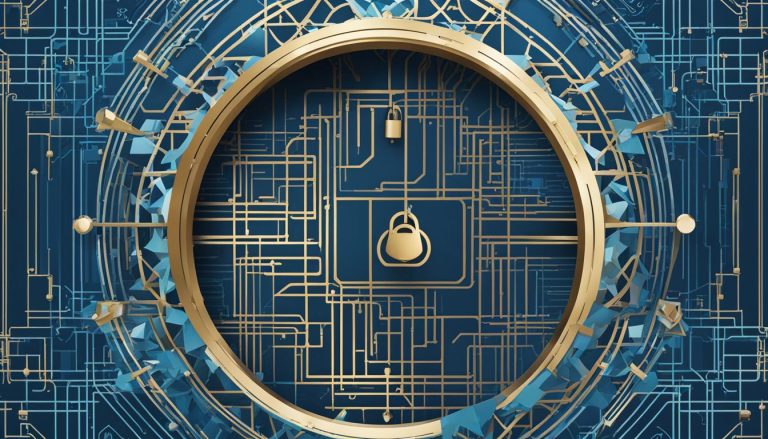Greetings! Today, I will be delving into the fascinating concept of tokenization. Have you ever wondered how sensitive data like bank account numbers can be protected in an increasingly digitized world? Well, that’s where tokenization comes into play.
Tokenization is the process of replacing sensitive data, such as a bank account number, with a non-sensitive substitute called a token. This token is a randomized data string that has no exploitable value. It retains all the relevant information about the data without compromising its security. Tokenization offers several benefits, including enhanced security, increased protection from breaches, and compliance with industry standards such as PCI DSS.
Now, let’s take a closer look at how tokenization works and its significance in various industries.
Key Takeaways:
- Tokenization is the process of substituting sensitive data with a non-sensitive token.
- It enhances security, protects against breaches, and ensures compliance with industry standards.
- Tokenization is different from encryption, as tokens cannot be decrypted or reversed.
- It has applications in areas such as data security, natural language processing, and machine learning.
- Tokenization revolutionizes the digital economy by democratizing wealth creation.
Stay tuned as we dive deeper into the world of tokenization and explore its various applications!
How Does Data Tokenization Work?
Data tokenization is a powerful technique that provides enhanced security and protection for sensitive data. Let’s dive into the details of how data tokenization works and its various uses in different industries.
In the context of payment processing, data tokenization involves the substitution of credit card or account numbers with unique tokens. These tokens are randomly-generated alphanumeric IDs that have no connection to the original data or the individual associated with it. This process effectively removes any link between the transaction and the sensitive data, significantly minimizing the risk of exposure to breaches. To ensure the secure storage and generation of tokens, organizations must utilize a robust payment gateway system.
Tokenization goes beyond payment processing and has a wide range of applications across industries. It can be used to protect other valuable information such as personal identification numbers (PINs), social security numbers, or any other sensitive data that needs to be stored securely. By utilizing tokenization techniques, organizations can protect sensitive data and ensure compliance with industry standards. Furthermore, tokenization provides an added layer of security by rendering the tokens meaningless to anyone other than the authorized party.
Overall, tokenization techniques offer a highly effective way to safeguard sensitive data and reduce the risk of breaches. By replacing sensitive data with tokens, organizations can enhance security, achieve regulatory compliance, and build trust with their customers.
Tokenization vs Encryption: What’s the Difference?
When it comes to protecting sensitive data, two popular methods are tokenization and encryption. While both techniques aim to safeguard information, they differ in their approach and level of security.
Encryption: Encryption involves scrambling data using a secret key, rendering it unreadable to unauthorized individuals. This process allows encrypted data to be decrypted and restored to its original form when the correct key is used. Encryption is widely used to secure data during transmission and storage, such as in online banking or email communication. However, the encrypted data can still be decrypted if the key falls into the wrong hands.
Tokenization: In contrast, tokenization replaces sensitive data with a randomized substitute called a token. This token has no exploitable value and is generated using a specific algorithm. Unlike encryption, tokenization does not have a key that can reverse the process. Tokens are meaningless to anyone other than the authorized party, making tokenization a highly secure method of data protection. Tokenization is commonly used in industries that handle sensitive information, such as healthcare and payment processing.
Comparison of Tokenization and Encryption:
| Aspect | Tokenization | Encryption |
|---|---|---|
| Method | Replaces data with a token | Scrambles data using a key |
| Data Restoration | Tokens cannot be reversed | Data can be decrypted with the correct key |
| Security | Tokens offer enhanced security and are meaningless to unauthorized individuals | Encryption can be decrypted if the key is compromised |
| Usage | Commonly used in industries handling sensitive data | Widely used for securing data during transmission or storage |
Overall, while encryption provides a level of security for data, tokenization offers enhanced protection by replacing sensitive information with tokens. Tokenization is especially valuable in sectors that require high levels of data security and compliance with regulations. By understanding the differences between tokenization and encryption, organizations can make informed decisions about the best approach to protect their valuable data.
Benefits of Tokenization for Data Security
Tokenization offers several important benefits for data security. First and foremost, it enhances customer assurance in eCommerce websites, increasing consumer trust in the handling of their sensitive information. By replacing sensitive data with tokens, businesses can ensure that customers’ personal and financial information is protected from potential breaches and unauthorized access.
Furthermore, tokenization provides increased security by eliminating the need to store sensitive information in internal databases or transmit it through information systems. This significantly reduces the risk of data exposure and minimizes the potential impact of a breach. Tokenization also simplifies compliance with industry-specific regulations, such as the Health Insurance Portability and Accountability Act (HIPAA) in the healthcare industry, ensuring that organizations meet the necessary data protection requirements.
Tokenization is particularly crucial for protecting cardholder data in the payment card industry. By tokenizing credit card or account numbers, businesses can achieve compliance with the Payment Card Industry Data Security Standard (PCI DSS). This not only enhances security but also builds trust with customers, as they can feel confident that their payment information is being handled securely.
Tokenization Examples
One real-life example of tokenization is in the field of text analysis. Tokenization is used to break down blocks of text into individual words or tokens, enabling further analysis and processing. This process is particularly useful in natural language processing tasks, such as sentiment analysis, text classification, and information extraction. By tokenizing text, algorithms can gain a better understanding of the underlying content and extract meaningful insights.
| Token | Frequency |
|---|---|
| data | 25 |
| security | 18 |
| tokenization | 12 |
| information | 10 |
In the table above, we can see an example frequency distribution of tokens in a given text. This provides insights into the most frequently occurring words and allows for further analysis and interpretation. Tokenization is a fundamental step in text analysis and plays a vital role in unlocking the value of unstructured textual data.
In conclusion, tokenization offers significant benefits for data security and has diverse applications across various industries. By leveraging tokenization techniques, businesses can enhance security, comply with regulations, and build trust with customers. Additionally, tokenization plays a crucial role in text analysis, enabling the extraction of valuable insights from unstructured data. As the importance of data security continues to grow, tokenization will remain a critical tool for protecting sensitive information in the digital age.
Tokenization as a Transformational Concept
Tokenization extends beyond data security and has the potential to transform various industries. In addition to protecting sensitive information, tokenization can be applied to natural language processing and machine learning.
Tokenization in natural language processing involves breaking down text into smaller units, known as tokens. This process enables analysis and processing of text data, which is vital for tasks such as sentiment analysis, language translation, and text classification. Tokenization algorithms play a crucial role in efficiently tokenizing text by identifying boundaries between words, sentences, or even characters.
Tokenization is a critical step in natural language processing as it provides the foundation for further analysis and understanding of text data. It allows for effective text representation, enabling machine learning models to process and learn from the structured tokenized data. By breaking down text into tokens, the complexities of language can be tackled more efficiently, leading to improved accuracy and performance in various NLP tasks.
In the field of machine learning, tokenization plays a significant role in data preprocessing. It involves converting raw text or input data into numerical representations that machine learning algorithms can process. Tokenization allows for the creation of feature vectors, where each token represents a unique feature or characteristic of the data.
Tokenization algorithms used in machine learning range from simple techniques like word tokenization, where text is split into individual words, to more complex approaches such as subword or character tokenization. These algorithms enable the transformation of text data into a format that can be effectively used for training machine learning models, facilitating tasks like text classification, sentiment analysis, and language generation.
| Tokenization in Natural Language Processing | Tokenization algorithms | Benefits |
|---|---|---|
| Tokenization in Machine Learning | Word tokenization | Enables text classification and sentiment analysis |
| Subword tokenization | Facilitates language generation tasks |
Tokenization in both natural language processing and machine learning plays a critical role in unlocking the potential of textual data. These tokenization techniques enable more efficient data processing, improved model performance, and enhanced accuracy in various language-based tasks. By harnessing the power of tokenization, industries can leverage the transformative capabilities of tokenization to gain valuable insights and drive innovation.
Tokenization in the New Digital Economy
Tokenization is revolutionizing the new digital economy by democratizing wealth creation and transforming traditional assets into digital tokens. This innovative concept allows individuals of all backgrounds to access investment opportunities that were once limited to the wealthy. By buying, selling, or trading digital tokens, anyone can now invest in real estate, fine art, and other assets. The backbone of tokenization lies in blockchain technology, which ensures transparency, immutability, and security of transactions.
In the tokenized economy, traditional assets are converted into digital tokens, enabling fractional ownership and providing liquidity to previously illiquid investments. By leveraging blockchain, tokenization eliminates intermediaries and reduces transaction costs, making investing more accessible and efficient. The transparency and security of blockchain technology also instill confidence and trust among investors, fostering a more inclusive and democratic financial landscape.
Tokenization and Its Impact
Tokenization not only revolutionizes traditional assets but also expands its potential to include intellectual property, personal data, and individual skills and capabilities. With tokenization, individuals can monetize their talents and expertise by creating tokens that represent their unique skills. This unlocks new economic possibilities and empowers individuals to participate in the economy in novel and exciting ways.
Furthermore, tokenization opens up opportunities for small businesses and startups to raise funds through tokenized crowdfunding campaigns, providing alternative financing options that were once restricted to venture capital. This decentralized approach to fundraising enhances financial inclusion, stimulates innovation, and promotes economic growth.
The Future of Tokenization
The future of tokenization is boundless, with the potential to create entirely new markets and unlock untapped economic value. However, there are challenges that need to be addressed, including regulatory hurdles and technical complexities. As tokenization continues to evolve, regulations must adapt to ensure consumer protection and mitigate risks. Additionally, technical advancements and interoperability between different tokenization systems will be crucial for widespread adoption and integration across industries.
The transformative power of tokenization in the new digital economy cannot be underestimated. By embracing tokenization, we can unlock opportunities for wealth creation, empower individuals, and reshape industries. As we navigate the tokenized future, it is essential to embrace its potential and collaborate to overcome challenges, ensuring a secure, inclusive, and prosperous digital economy for all.
The Future of Tokenization and its Potential
As we delve into the future of tokenization, the possibilities and potential seem limitless. This transformative concept has the power to create entirely new markets and unlock untapped economic value by tokenizing various assets and capabilities. By converting real-world assets into digital tokens, tokenization democratizes access to investment opportunities that were traditionally limited to the wealthy.
However, as tokenization expands its reach, it must overcome regulatory challenges and technical complexities. Adapting regulations to ensure consumer protection and mitigate potential risks will be essential for the widespread adoption of tokenization. Additionally, advancements in technology and interoperability between different tokenization systems will play a crucial role in integrating tokenization across industries.
Despite these challenges, the potential rewards of embracing tokenization are enormous. Tokenization offers enhanced data security, increased accessibility to investment opportunities, and unlocks new economic possibilities. It provides a valuable tool for protecting sensitive information and enables the democratization of wealth creation. With its ability to reshape industries and empower individuals, tokenization is poised to revolutionize the way we conduct business in the digital age.
Regulatory Challenges
One of the key challenges facing tokenization is the need to navigate and adapt to existing regulations. As tokenization expands into new industries and asset classes, regulators will need to develop frameworks to address the unique aspects of these digital assets. This includes establishing guidelines for investor protection, market transparency, and preventing fraudulent activities. It is essential for regulators to strike a balance between fostering innovation and safeguarding against potential risks, ensuring that the benefits of tokenization can be realized while minimizing any potential harm.
Technical Complexities
Implementing and integrating tokenization systems can present technical complexities. Tokenization requires secure infrastructure and robust platforms capable of generating, storing, and managing tokens. Interoperability between different tokenization systems is crucial for seamless transactions and widespread adoption. Furthermore, ensuring the scalability and efficiency of tokenization solutions is essential to handle the increasing volume of transactions and data. Overcoming these technical challenges will enable tokenization to reach its full potential and revolutionize industries beyond finance and payments.
Conclusion
Embracing tokenization is the key to unlocking a tokenized revolution that will reshape industries and empower individuals. This transformative concept offers enhanced data security, increased accessibility to investment opportunities, and the potential to unlock new economic possibilities.
Tokenization provides a valuable tool for protecting sensitive information and ensuring compliance with industry standards. By replacing sensitive data with tokens, organizations can minimize the risk of breaches and enhance customer trust in eCommerce websites. Tokenization also plays a crucial role in sectors like healthcare, where it helps comply with regulations such as HIPAA.
But tokenization goes beyond data security. It has the power to transform various industries by enabling more efficient language and data processing. Tokenization algorithms and techniques enhance the accuracy and efficiency of natural language processing and machine learning tasks, opening up new possibilities for analysis and automation.
As we move forward into the tokenized future, there are challenges to overcome – regulatory hurdles and technical complexities. However, the potential rewards of embracing tokenization are enormous. By democratizing wealth creation and extending beyond physical assets to intellectual property and personal data, tokenization is reshaping the economy and creating new opportunities for everyone.
FAQ
What is tokenization?
Tokenization is the process of replacing sensitive data, such as a bank account number, with a non-sensitive substitute called a token. Tokens are randomized data strings that retain the relevant information about the data without compromising its security.
How does data tokenization work?
In the context of payment processing, tokenization involves substituting a credit card or account number with a token. This token is a randomly-generated alphanumeric ID that has no connection to an account or individual. Tokenization removes any link between the transaction and the sensitive data, minimizing the risk of exposure to breaches.
What is the difference between tokenization and encryption?
Encryption uses a secret key to render data unreadable, with the ability to be restored to its original state. Tokenization, on the other hand, replaces sensitive data with a token that cannot be decrypted or reversed. Tokenization offers enhanced security compared to encryption, as tokens are meaningless to anyone other than the authorized party.
What are the benefits of tokenization for data security?
Tokenization enhances customer assurance in eCommerce websites and provides increased security and protection from breaches by eliminating the need to store sensitive information in internal databases or transmit it through information systems. It can also be used to comply with industry regulations and standards like PCI DSS and HIPAA.
How is tokenization used in natural language processing and machine learning?
Tokenization is used to break down text into smaller units, enabling analysis and processing. It offers algorithms and techniques that enhance the efficiency and accuracy of language and data processing tasks, making it a valuable tool in the fields of natural language processing and machine learning.
How does tokenization impact the new digital economy?
Tokenization converts real-world assets into digital tokens, democratizing access to investment opportunities that were traditionally limited to the wealthy. It allows anyone to invest in assets like real estate or fine art by buying, selling, or trading digital tokens. Tokenization is powered by blockchain technology, ensuring transparency, immutability, and security of transactions.
What is the future of tokenization?
The future of tokenization is filled with limitless potential. It has the capacity to create entirely new markets and unlock untapped economic value by tokenizing various assets and capabilities. However, challenges such as regulatory hurdles and technical complexities need to be addressed for widespread adoption and integration across industries.
Cathy is a senior blogger and editor in chief at text-center.com.


